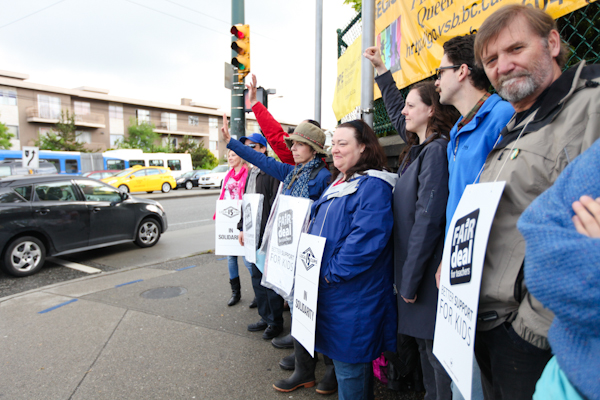Coming two grim days after the U.S. presidential election, Thursday’s judgment by the Supreme Court of Canada was exhilarating: B.C. teachers had suddenly won a 15-year battle with the Liberal government of Christy Clark.
The Twitter hashtag #bced exploded in rejoicing, mixed with some sorrow from parents whose kids had been part of a lost generation going through B.C. schools during a decade and a half of deliberately crowded classes and diminished resources. Teachers who had retired during those 15 years expressed some bittersweet comfort at the decision.
The Supreme Court of Canada decision found that the Liberal government had, repeatedly, acted illegally in using legislation to strip provisions from teachers’ contracts that set limits on class sizes and mandated levels of support for students with special needs. The result will likely be hundreds of additional teachers and specialists supporting children in B.C. schools.
The B.C. Teachers’ Federation, after triggering this online avalanche of rejoicing with tweets, got around to posting a statement by its president Glen Hansman, celebrating the success and keeping the pressure on the government.
“The BCTF values our productive relationship with Ministry of Education staff on areas of common ground like curriculum revision and enhancing Aboriginal Education, but it has been the political players in government that chose to keep fighting and needlessly wasted taxpayers’ money in court. That time, energy, and money should have been invested in kids all along.”
Meanwhile Education Minister Mike Bernier lay low while Finance Minister Mike de Jong issued the government’s careful response.
“Government assures all parents and students we continue to be focused on outcomes for students,” de Jong’s statement said. “We have one of the best education systems in the world; student outcomes have improved significantly over the past 15 years. We have also established added investments like the $100-million Learning Improvement Fund that involves classroom teachers in how to best meet the unique needs of their students and classrooms. We are committed to working constructively with the BCTF to keep making our classrooms better.”
No return on ‘investment’
Notice that both sides lean on the word “investment”: The BCTF wishes the government’s legal spending had been invested instead in education, while de Jong talked about investing another $100 million in some vague enhancement of teachers’ classroom performance.
Neither side will see a nickel of return on this “investment,” but it’s the current buzzword for describing the spending of taxpayers’ dollars so taxpayers won’t squawk too much.
Neither side mentioned the key point out of this decision. The B.C. government lawyers made their case and answered some questions from the justices. Then the justices adjourned for a few minutes, came back, and laughed the government out of court.
Think about that. They went into their chambers, they must have shaken their heads at one another, and they agreed by seven to two that the B.C. government had been wasting everyone’s time and money since 2002 defending a patent violation of the Charter of Rights and Freedoms. The court wasn’t going to waste any more time by deliberating until spring and releasing a written judgment (which both parties had expected).
That was a quiet rejection not only of Christy Clark, who was Gordon Campbell’s education minister when the government ripped up teachers’ contracts, but also a dismissal of the B.C. Court of Appeal, which had overturned B.C. Supreme Court Justice Susan Griffin’s original decision in favour of the teachers.
Clark and her cabinet must have known for years that they were on thin legal ice. They would have had the best legal advice in the province, and the Supreme Court of Canada’s decision would have been foreseen even before Campbell escaped to his federally appointed high commissioner’s job in London. Maybe they thought they could win a war of financial attrition with the BCTF.
So they fought their idle case for 14 years, while a whole generation of children entered kindergarten and emerged (some of them) from Grade 12. While the BCTF called on its members for still more support for the case, the Liberals used taxpayers’ money to drag the case from court to court. Millions that could have gone into special-needs education or teacher librarians helped instead to enrich a few government lawyers, whom the Supreme Court brushed off like dust specks on their robes.
This was not just a legal problem; it was a cultural problem, the problem of a Social Credit/Liberal party that refuses to change no matter how often it rebrands itself.
If the old patriarch W.A.C. Bennett had had a vision beyond highways and dams, he would have seen the need for a highly educated population. Instead he mistrusted almost anyone who’d spent time on a campus, and his political descendants haven’t learned any better. Better a half-century of school wars, at whatever cost, than to seize the wonderful opportunity of building the world’s best education system.
Many diehard Liberal/Socred supporters don’t care about education any more than Christy Clark’s government. But not all. Some, with children or grandchildren in the system, will realize they’ve been conned since the Liberals took power. If they care about their own kids, they’ll help throw Clark out of power next year, just as the justices threw her out of court on Nov. 10. ![]()
Read more: Rights + Justice, Politics, Education, Labour + Industry, BC Politics

















Tyee Commenting Guidelines
Comments that violate guidelines risk being deleted, and violations may result in a temporary or permanent user ban. Maintain the spirit of good conversation to stay in the discussion.
*Please note The Tyee is not a forum for spreading misinformation about COVID-19, denying its existence or minimizing its risk to public health.
Do:
Do not: